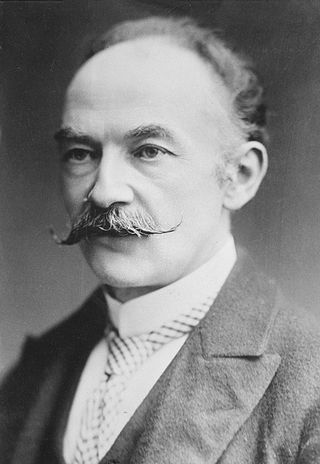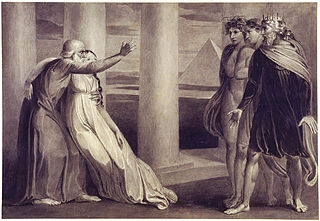Related Research Articles

Thomas Hardy was an English novelist and poet. A Victorian realist in the tradition of George Eliot, he was influenced both in his novels and in his poetry by Romanticism, including the poetry of William Wordsworth. He was highly critical of much in Victorian society, especially on the declining status of rural people in Britain such as those from his native South West England.

The word thou is a second-person singular pronoun in English. It is now largely archaic, having been replaced in most contexts by the word you, although it remains in use in parts of Northern England and in Scots. Thou is the nominative form; the oblique/objective form is thee ; the possessive is thy (adjective) or thine ; and the reflexive is thyself. When thou is the grammatical subject of a finite verb in the indicative mood, the verb form typically ends in -(e)st, but in some cases just -t.

"Ode on a Grecian Urn" is a poem written by the English Romantic poet John Keats in May 1819, first published anonymously in Annals of the Fine Arts for 1819.

"Thanatopsis" is an early poem by the American poet William Cullen Bryant. Meaning 'a consideration of death', the word is derived from the Greek 'thanatos' (death) and 'opsis'.

"Maryland, My Maryland" was the state song of the U.S. state of Maryland from 1939 until 2021. The song is set to the melody of "Lauriger Horatius" — the same tune "O Tannenbaum" was taken from. The lyrics are from a nine-stanza poem written by James Ryder Randall (1839–1908) in 1861. The state's general assembly adopted "Maryland, My Maryland" as the state song on April 29, 1939.

A Ceremony of Carols, Op. 28 is an extended choral composition for Christmas by Benjamin Britten scored for three-part treble chorus, solo voices, and harp. The text, structured in eleven movements, is taken from The English Galaxy of Shorter Poems, edited by Gerald Bullett. It is principally in Middle English, with some Latin and Early Modern English. It was composed in 1942 on Britten's sea voyage from the United States to England.

Tiriel is a narrative poem by William Blake, written c.1789. Considered the first of his prophetic books, it is also the first poem in which Blake used free septenaries, which he would go on to use in much of his later verse. Tiriel was unpublished during Blake's lifetime and remained so until 1874, when it appeared in William Michael Rossetti's Poetical Works of William Blake. Although Blake did not engrave the poem, he did make twelve sepia drawings to accompany the rough and unfinished manuscript. However, three of them are considered lost as they have not been traced since 1863.

Matthew 8:2 is the second verse of the eighth chapter of the Gospel of Matthew in the New Testament. This verse begins the miracle story of Jesus cleansing a leper, the first of a series of miracles in Matthew.

"The Bailiff's Daughter of Islington" is a traditional English folk song. It is numbered as Child ballad 105, and as Roud number 483.

Vinkensport is a competitive animal sport in which male common chaffinches are made to compete for the highest number of bird calls in an hour. Also called vinkenzetting. It is primarily active in Flanders, the Dutch-speaking region of Belgium.
Baba ben Buta was a Jewish sage who lived at the time of Herod the Great, who is mentioned in the Talmud.

Song Offerings is a volume of lyrics by Bengali poet Rabindranath Tagore, rendered into English by the poet himself, for which he was awarded the 1913 Nobel Prize in Literature.
Coronation Ode, Op. 44 is a work composed by Edward Elgar for soprano, alto, tenor and bass soloists, chorus and orchestra, with words by A. C. Benson.

"The Hymn of Joy" is a poem written by Henry van Dyke in 1907 in being a Vocal Version of the famous "Ode to Joy" melody of the final movement of Ludwig van Beethoven's final symphony, Symphony No. 9.
"Dura Navis" was composed by Samuel Taylor Coleridge in 1787. It is one of his earliest known poems and was written for a school assignment while Coleridge attended Christ's Hospital. The poem describes the pain of solitude that accompanies travel and the risks that accompany a voyage at sea, including combat against others and resorting to cannibalism.
Gormflaith ingen Flann Sinna was an Irish Queen of Tara, Munster, and Leinster.

"Sonnet X", also known by its opening words as "Death Be Not Proud", is a fourteen-line poem, or sonnet, by English poet John Donne (1572–1631), one of the leading figures in the metaphysical poets group of seventeenth-century English literature. Written between February and August 1609, it was first published posthumously in 1633.
"Contemplations" is a 17th-century poem by English colonist Anne Bradstreet. The poem's meaning is debated, with some scholars arguing that it is a Puritan religious poem while others argue that it is a Romantic poem.
"On the Death of Mr. Crashaw" is an elegy by English poet Abraham Cowley in commemoration of his friend Richard Crashaw's death. First published in 1656, it is considered by literary critics as one of Cowley's greatest poems.

Emma Kate Corkhill (1866–December 13, 1913) was an early female professor of coeducational universities with a Ph.D. degree in the United States and an academic in English Literature.
References
- ↑ Ray, Martin (2007). Thomas Hardy Remembered. Ashgate Publishing, Ltd. ISBN 978-0-7546-3973-2. pg. 193
- ↑ The Era of Casual Fridays (a commonplace book (with commentary) devoted to literature)